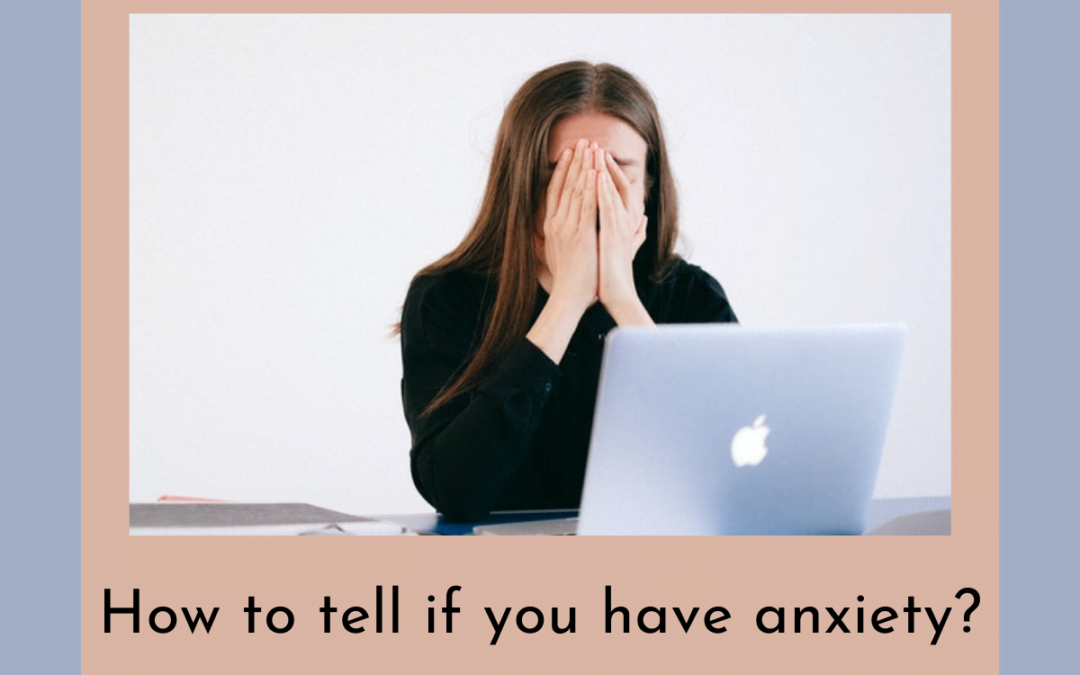Have you noticed telling yourself, I don’t think I have anxiety, then what is this that I am feeling, is this anxiety.
Anxiety and stress might have overlapping symptoms. Sometimes it’s difficult to figure out if what you are experiencing is stress which is more temporary or anxiety which seems to come from nowhere. How can you tell if you have anxiety?
We all feel stressed and anxious from time to time. Anxiety is always living in the future away from the present. A little bit of anxiety is not always bad. Anxiety is just another feeling that gives us information and tells us that we might be out of our comfort zone or we might not be feeling safe. So at what point does anxiety cross the line and become bad?
Stress is a reaction to everyday pressures of life. It shows itself in the form of:
Feeling irritable
Moodiness
Frustration
Being short tempered
Feeling overwhelmed
Having unhealthy eating and sleeping habits
Stress can be triggered by a transitory situation. For example, starting a new job, moving to a new city or starting a family. Any form of life transition can cause stress. It is also caused by situations like long-term unemployment or an unhappy marriage. Both transitory and long term situations set off a stress response in our body.
With proper support, self care and self awareness we can provide our body the opportunity to reset. With transitory stressors a lot of the time as the situation passes, stress subsides giving our body the opportunity to reset. However, when the stress response is chronically activated due to excessive worrying and fear our body does not get the opportunity to reset it’s hormones and chemicals to normal levels, resulting in a lot of other physical and emotional problems.
An emotional consequence of stress is anxiety and depression.
Anxiety
A stressful situation can cause us to react anxiously. A little anxiety is not always bad. It puts our body in a state of heightened awareness. So that we can be present and defend ourselves. An optimal amount of anxiety can help us prepare for a foreseeable future. For example, an appropriate amount of anxiety can motivate us to prepare for an exam.
Anxiety becomes a problem when the fear and worry is overwhelming and constant. An anxious person reacts quickly and intensely to stressful situations. Even thinking about the situation can be distressful and disabling. For example, if we are stressed about meeting a deadline at work the fear associated with not being able to finish work before the deadline could be so overwhelming that the thought of doing that work might cause nausea, dizziness, chest pain and sometimes a panic attack. As a result this will make us avoid working.

Ways to tell if you have anxiety?
Here are some questions you can ask yourself to tell if what you are experiencing is anxiety:
- Do you find yourself spending a lot of time thinking about what other people might think about you?
- Do you worry excessively about something bad happening?
- Do you feel like you are always on edge?
- Do your thoughts keep you up all night?
- Do you find it really difficult to shake off your worries?
- Do you find yourself avoiding situations because it causes anxiety?
- Do you have a difficult time being in the present and celebrating successes or peaceful moments because you are worried about something bad happening?
- Do you feel irritated and overwhelmed?
- Do you feel like you have a short fuze these days?
- Do you find yourself waiting for the other shoe to drop?
Along with the emotional symptoms, anxiety manifests itself physiologically as well. It is our body’s response to perceived threat which triggers the fight-flight response sending out a number of warning signals to our body.
- Shortness of breath
- Increased heart rate
- sweating
- Stomach upset
- Dizziness
- Nausea
- Muscle Tension
- Numbness or tremors
Treatment for Anxiety
Excessive worry, ongoing irrational fear and negative self-talk prevents us from focusing on reality or thinking clearly. It causes us distress and interferes with our everyday life. We tell ourselves that the worst is going to happen. This thought makes us believe that the threat is imminent which triggers the fight-flight-freeze response. The constant loop of negative self-talk can keep our body in a constant heightened mode and might never give us the opportunity to calm down and relax.
Everyone is an individual who comes with their own set of unique experiences, strengths and weaknesses. Therefore, the treatment varies from person to person. There are some modalities that work well for anxiety. The treatment focuses on identifying triggers, gaining awareness, and identifying patterns. Mindfulness and meditation is used to calm the physical symptoms of anxiety. CBT is used to identify thought patterns, feelings and behavior. A lot of time is spent on emotional regulation, so that you can learn to calm your body and stay grounded in the present. EMDR is also used to work on the root cause of anxiety.
If you feel like you can tell what you have is anxiety or even if you are not able to tell that it’s anxiety but you can relate to some of the symptoms then seek help. Therapy will help you learn tools to regulate your system, make you feel confident about working through the symptoms of anxiety, help you get aware of your triggers and work through the root cause of anxiety. Although our body is capable of regulating itself, when someone has been experiencing stress and anxiety for a number of years their body might not be able to regulate itself on its own and might need some help through medication.


Recent Comments